You can naturally preserve your handcrafted perfumes using organic antifungal herbs that double as aromatic ingredients. Common kitchen herbs like thyme, oregano, and cinnamon offer potent protection while adding depth to your fragrance. Store your creations in dark bottles with tight-fitting caps, and incorporate essential oils like tea tree or eucalyptus at 3-5 drops per ounce. Understanding how to blend these protective herbs will enhance both your perfume's longevity and complexity.
Understanding Natural Fungal Growth in Perfumes
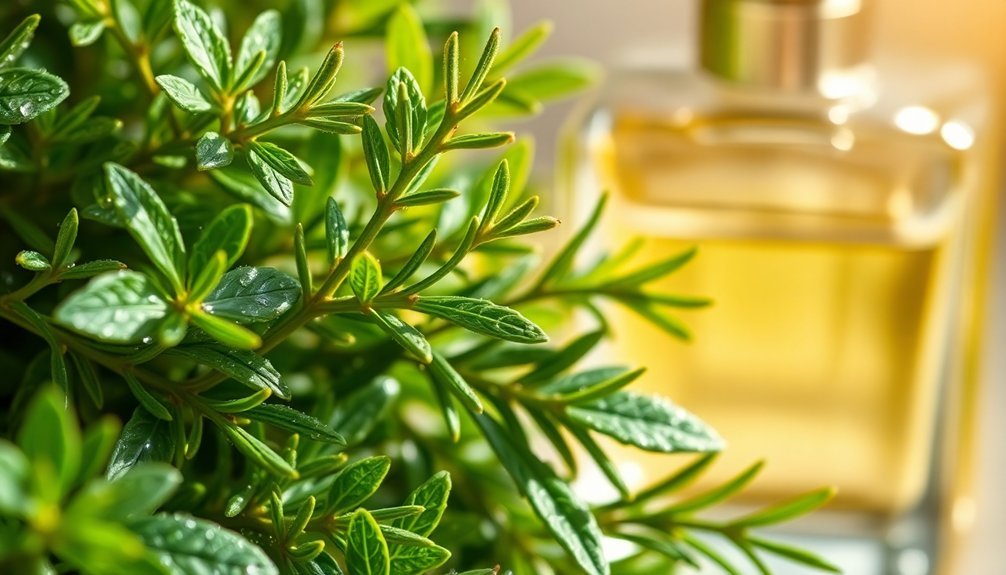
While many people think of perfumes as purely botanical extracts, the complex aromas we enjoy often stem from the intricate relationship between plants and their natural microorganisms.
These tiny fungi and bacteria on flower surfaces play an essential role in creating the distinctive scents you love.
You'll find that these microorganisms actively influence the production of volatile organic compounds (VOCs), which give your favorite perfumes their unique character.
When you're using natural perfumes, you're experiencing the results of these delicate interactions.
The presence or absence of specific fungi can dramatically alter a fragrance's profile – just as you'll notice in prized ingredients like agarwood (oud), where fungal activity creates those deep, woody notes.
Understanding this relationship helps you appreciate why natural perfumes can't be perfectly replicated with synthetic compounds.
Research has shown that when flowers are treated with wide-spectrum antibiotics, their natural fragrances change significantly.
Essential Herbs With Antifungal Properties
When seeking natural solutions to combat fungal issues, you'll find several powerful organic herbs that offer potent antifungal properties.
Black walnut contains juglone, which works alongside phenolic compounds to effectively fight against Candida and various mold species. Grapefruit seed extract effectively prevents mycelial fungal growth and destroys existing biofilms.
You'll discover Echinacea's impressive ability to boost your immune system while targeting fungi through its polysaccharides and alkamide compounds.
Common kitchen herbs like garlic, oregano, and thyme pack a powerful punch against fungi.
Garlic's allicin, oregano's thymol, and carvacrol work effectively both topically and internally.
Don't overlook other potent options like cinnamon, neem, and Oregon grape, which contain natural compounds that inhibit fungal growth.
These herbs can help preserve your perfumes while providing additional antibacterial benefits through their essential oils and active constituents.
Best Herbal Combinations for Perfume Preservation
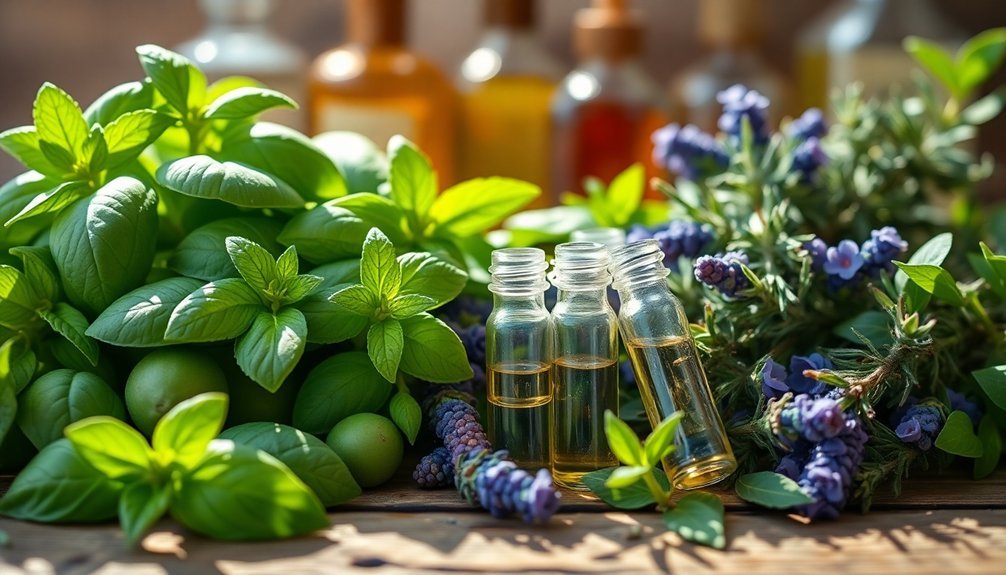
Creating lasting natural perfumes requires strategic combinations of herbs that work together for both preservation and scent stability.
You'll want to start with fixative herbs like frankincense, patchouli, or sandalwood as your base, which help anchor your blend and extend its longevity. Layer these with middle notes like lavender or geranium for balance, then add bright top notes such as bergamot or wild orange for initial impact.
Recording measurements in a scent creation journal helps perfect your preservation formula over time. To preserve your blend effectively, combine your chosen herbs with a carrier oil like fractionated coconut oil or jojoba oil.
For additional preservation, you can incorporate high-proof alcohol or non-GMO spiced rum. This combination of fixatives, layered aromatics, and preservative bases won't just make your perfume last longer – it'll maintain the integrity of your scent profile while naturally protecting against degradation.
Proper Storage Methods Using Natural Preservatives
To maximize the longevity of your natural perfumes, proper storage methods combined with natural preservatives play an essential role.
Store your fragrances in a cool, dark closet or drawer, away from bathroom humidity and direct sunlight. You'll want to avoid windowsills and areas near radiators, as temperature fluctuations can alter your perfume's composition.
Consider using airtight protective cases lined with natural antifungal herbs to create an additional barrier against environmental factors.
Always verify you've tightly sealed the cap after each use, and don't shake the bottle as this can disrupt the delicate mixture.
For extra protection, you can refrigerate well-sealed perfumes, but be sure to protect them from food odors.
Remember that natural citrus-based perfumes are more sensitive and require extra care compared to oriental or leathery fragrances.
Incorporating Antifungal Herbs Into Perfume Recipes
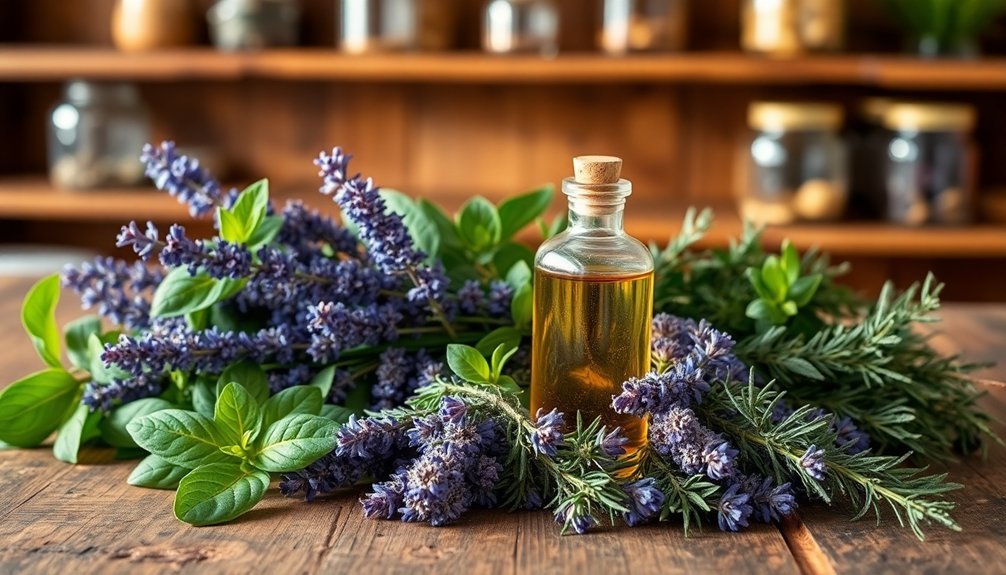
Several powerful antifungal herbs can transform your natural perfume recipes while extending their shelf life.
You'll find that essential oils like thyme, cinnamon, and oregano not only provide distinctive fragrances but also protect your perfumes from fungal growth. To create effective antifungal perfumes, you'll need to blend these oils strategically with your alcohol base.
- Tea tree oil works excellently as a top note while providing broad-spectrum protection against fungi.
- Combine eucalyptus and basil oils for a fresh, middle-note aroma with enhanced preservative properties.
- Use thyme or cinnamon as base notes to anchor your fragrance and provide long-lasting antifungal benefits.
- Add a few drops of Cymbopogon flexuosus to boost both the citrusy scent and protective qualities.
Mix these oils in small concentrations, typically 3-5 drops per ounce of base, to achieve ideal results.
Safety Guidelines for Natural Perfume Preservation
Proper storage and handling techniques form the foundation of safe natural perfume preservation.
You'll want to keep your perfumes in a cool, dark place away from direct sunlight and heat sources. Don't store them in bathrooms or near windows where temperatures fluctuate.
Always maintain tight seals on your bottles and don't leave them uncapped for long periods. Instead of shaking your perfumes, gently roll them between your palms to mix the ingredients.
If you're not using a perfume regularly, store it in the refrigerator at 2-5 degrees Celsius.
Keep your perfumes in their original dark glass bottles and packaging, as these are designed to protect against environmental factors.
Avoid exposing them to moisture and humidity, which can alter their fragrance and compromise their quality.
Frequently Asked Questions
Can I Use Dried Herbs Instead of Essential Oils for Perfume Preservation?
You shouldn't use dried herbs instead of essential oils in perfumes, as they're less potent and stable. They won't provide effective preservation and could introduce moisture and microorganisms that might spoil your perfume.
How Long Do Naturally Preserved Perfumes Typically Last Before Expiring?
You'll find that naturally preserved perfumes typically last 3-5 years when stored properly. If you keep them in a cool, dark place, they can maintain their quality, though citrus and floral scents may fade sooner.
Will Antifungal Herbs Change the Original Scent of My Perfume?
Yes, antifungal herbs will change your perfume's original scent. They contain strong aromatic compounds that'll alter the fragrance profile. You'll notice the biggest changes when using herbs like tea tree, oregano, or thyme.
Are There Any Herbs That Should Never Be Mixed Together?
You shouldn't mix aconite with bulbus fritillariae or licorice with euphorbiae. These herb combinations can be toxic. Always consult a healthcare provider before combining any herbs, as many can interact dangerously.
Can I Test My Perfume for Fungal Growth at Home?
You can use a diluted bleach test on a small perfume sample – mix 16 parts water with 1 part bleach, apply with a cotton swab, and watch for color changes. Commercial test kits also work well.
In Summary
You've now got the knowledge to protect your precious perfumes naturally with antifungal herbs. By selecting potent herbs like thyme, oregano, and clove, you'll extend your fragrances' shelf life while maintaining their authentic scents. Remember to store your perfumes properly and always test for skin reactions. With these organic preservation methods, you're ready to create longer-lasting, naturally preserved perfumes that are safe and effective.
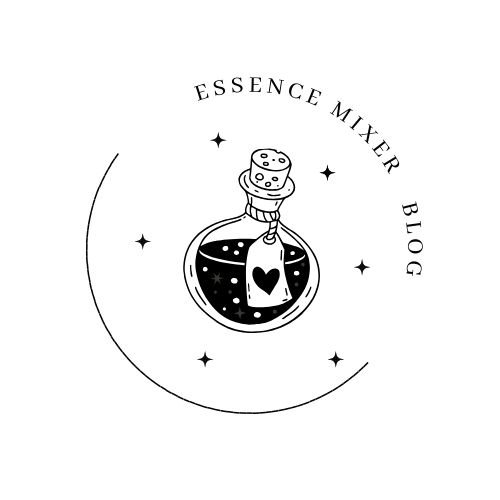
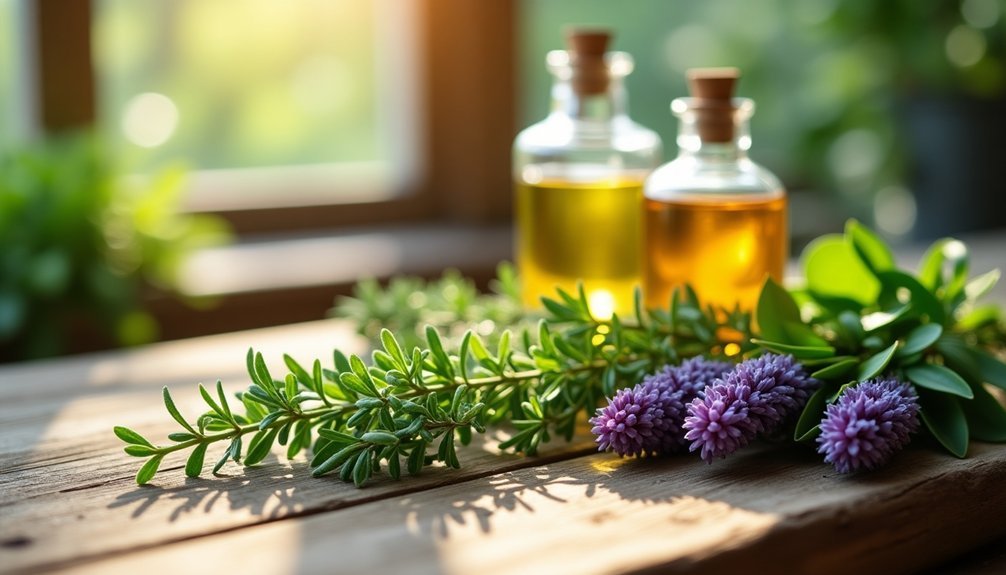


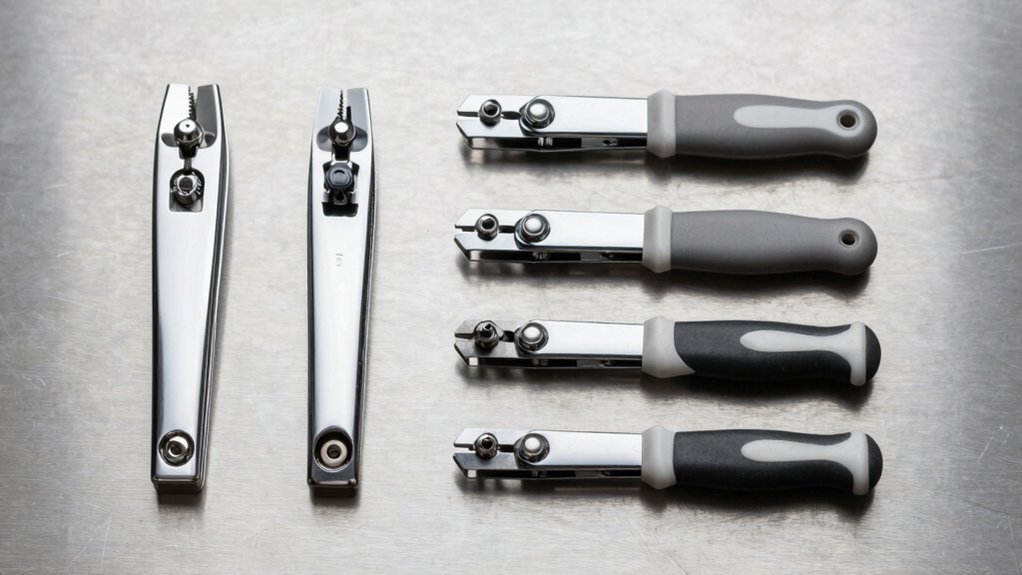
Leave a Reply